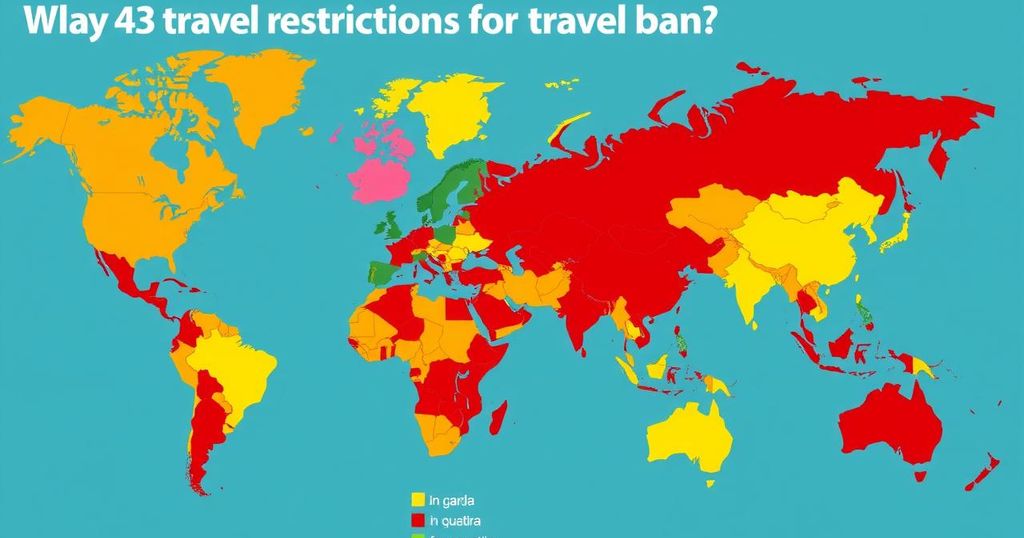The Trump administration is considering a travel ban targeting up to 43 countries, including a “red” list of 11 nations barred from entry and an “orange” list with travel restrictions. The proposal raises questions about existing visa holders and implications for U.S. foreign relations, particularly regarding Russia and Venezuela. Trump’s executive order aims to improve national security vetting processes.
The Trump administration is contemplating a new travel ban that may encompass citizens from up to 43 countries, expanding on prior restrictions from his first term. A draft list prepared by diplomatic and security officials categorizes countries, with 11 nations, labeled as the “red” list, facing outright entry bans into the U.S. These are Afghanistan, Bhutan, Cuba, Iran, Libya, North Korea, Somalia, Sudan, Syria, Venezuela, and Yemen.
The review of this draft is currently undertaken by officials at embassies, regional bureaus, and various security specialists. They are annotating the accuracy of deficiencies associated with specific countries and assessing potential policy ramifications that might justify excluding certain nations to preserve cooperative efforts in other priority areas.
The draft also contains an “orange” list of 10 countries where travel would be restricted but not entirely barred. In these instances, affluent business travelers might still be granted entrance, while immigrant and tourist visa applicants would face additional scrutiny, including compulsory in-person interviews. The countries listed include Belarus, Eritrea, Haiti, Laos, Myanmar, Pakistan, Russia, Sierra Leone, South Sudan, and Turkmenistan.
Upon taking office, President Trump mandated the State Department to identify countries warranting travel bans based on insufficient vetting and screening processes. A preliminary report outlining this list is expected to be submitted to the White House soon. The Bureau of Consular Affairs leads this effort, assisted by Justice, Homeland Security Departments, and intelligence agencies.
Recently, reports suggested that Afghanistan would be included in the new ban, a significant shift given its previous absence in the first-term restrictions. However, ambiguity remains about whether existing visa holders would have exemptions or if their visas would be annulled. The administration’s stance on current green card holders is also unclear.
The administration’s recent actions include the cancellation of a green card for Mahmoud Khalil, a Syrian student, who faced backlash for his protests against the U.S. government’s policies regarding Gaza. Some nations on the draft lists have been previously sanctioned, while others are newly included, often characterized by poor governance or majority Muslim populations, though the rationale for specific additions like Bhutan lacks clarity.
The inclusion of Russia raises questions, given Trump’s intentions towards fostering a friendlier U.S.-Russia relationship. Additionally, banning Venezuela could jeopardize diplomatic progress that would assist in managing undocumented migration.
A proposed “yellow” list comprises 22 nations given 60 days to rectify perceived deficiencies, with the risk of moving to stricter categories if compliance fails. This list includes countries like Angola, Cambodia, and Zimbabwe, among others.
During Trump’s first term, judicial challenges stymied the implementation of early versions of his travel bans, although a revised ban was ultimately upheld by the Supreme Court. In contrast, President Biden rescinded these bans in January 2021, criticizing them for tarnishing America’s image of inclusivity and welcome to all faiths. Trump’s latest executive order aims to reinstate bans to safeguard U.S. citizens from individuals perceived as threats.
The Trump administration is contemplating a broadening of travel bans designed to include up to 43 countries, categorically dividing them into red, orange, and yellow lists based on their security assessments. While the proposal emphasizes the importance of national security and vetting processes, it raises numerous questions about its implications on existing visa holders, international relations, and the inclusivity policies previously espoused by the Biden administration. Judicial resistance to earlier travel bans under Trump’s presidency highlights the complexity and potential for legal challenges to any new measures.
Original Source: newsroom.gy






